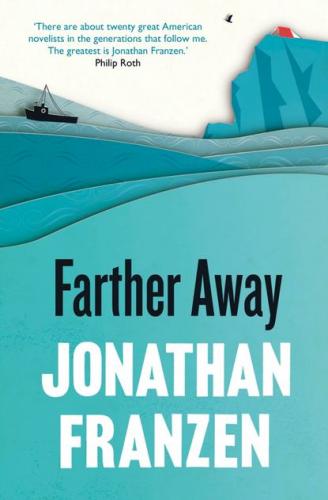JONATHAN FRANZEN
FARTHER AWAY
Copyright
4th Estate
An imprint of HarperCollinsPublishers 1 London Bridge Street London SE1 9GF
This ebook first published in Great Britain by 4th Estate in 2012
First published in the United States by Farrar, Straus and Giroux in 2012
Copyright © Jonathan Franzen 2012
The right of Jonathan Franzen to be identified as the author
of this work has been asserted by him in accordance
with the Copyright, Designs and Patents Act 1988
A catalogue record for this book is
available from the British Library
HB ISBN 978-0-00-745951-3
TPB ISBN 978-0-00-746308-4
All rights reserved under International and Pan-American Copyright Conventions. By payment of the required fees, you have been granted the nonexclusive, nontransferable right to access and read the text of this e-book on-screen. No part of this text may be reproduced, transmitted, downloaded, decompiled, reverse-engineered, or stored in or introduced into any information storage and retrieval system, in any form or by any means, whether electronic or mechanical, now known or hereinafter invented, without the express written permission of HarperCollins.
Ebook Edition © MAY 2012 ISBN: 9780007459520
Version 2017-03-28
Praise
From the reviews of Farther Away:
‘These essays are exemplary instances of reader-friendly criticism in that they can be studied profitably even by people unfamiliar with the works in question … One way or another, the essays in Farther Away are attempts to enlarge the place where literature and the responsiveness to it, can be preserved.’
Geoff Dyer, Observer
‘The world of literature, besieged as he believes it is, needs authors who care. And Franzen really cares. His attitude might be aggressively highbrow, but his underlying concerns are simple and humance: family, age, grief, love.’
Tim Walker, Independent
‘As with the best of essayists, Mr Franzen uses personal thoughts or anecdotes as a springboard to explore wider themes … A multifaceted and revealing collection, Farther Away actually brings the reader closer to the author.’
The Economist
‘In a book that is never less than superbly intelligent … Franzen’s wit and loving kindness comes as abrupt surprises as if a glossy, paunchy bishop has suddenly started to play hopscotch.’
Richard Davenport-Hines, Spectator
‘Franzen is arguably America’s greatest living novelist … In this anthology of magazine assignments, social criticism and cobweb-clearing travel journalism, he writes continually about writing and reading, luxuriating in language and sticking up for literature for literature’s sake. It’s a mostly thrilling journey … Franzen’s meditations on literature form the meat of this collection … Though seemingly preoccupied with writing and literature, his essays travel many subjects and moods.’
Paul Clements, Daily Telegraph
‘Brimful with the wit, invention and resonance of his fiction.’
Ben Felsenburg, Metro
Dedication
To Tom Hjelm, for the lessons in writing,
and to Göran Ekström, for the lessons in travel
Contents
Copyright
Dedication
PAIN WON’T KILL YOU (2011)
FARTHER AWAY (2011)
THE GREATEST FAMILY EVER STORIED (2010)
HORNETS (2010)
THE UGLY MEDITERRANEAN (2010)
THE CORN KING (2010)
ON AUTOBIOGRAPHICAL FICTION (2009)
I JUST CALLED TO SAY I LOVE YOU (2008)
DAVID FOSTER WALLACE (2008)
THE CHINESE PUFFIN (2008)
ON THE LAUGHING POLICEMAN (2008)
COMMA-THEN (2008)
AUTHENTIC BUT HORRIBLE (2007)
INTERVIEW WITH NEW YORK STATE (2007)
LOVE LETTERS (2005)
OUR LITTLE PLANET (2005)
THE END OF THE BINGE (2005)
WHAT MAKES YOU SO SURE YOU’RE NOT THE EVIL ONE YOURSELF? (2004)
OUR RELATIONS: A BRIEF HISTORY (2004)
THE MAN IN THE GRAY FLANNEL SUIT (2002)
NO END TO IT (1998)
Acknowledgments
Also by Jonathan Franzen
PAIN WON’T KILL YOU
[commencement address, Kenyon College, May 2011]
Good morning, Class of 2011. Good morning, relatives and faculty. It’s a great honor and pleasure to be here today.
I’m going to go ahead and assume that you all knew what you were getting into when you chose a literary writer to deliver this address. I’m going to do what literary writers do, which is to talk about themselves, in the hope that my experience has some resonance with your own. I’d like to work my way around to the subject of love and its relation to my life and to the strange technocapitalist world that you guys are inheriting.
A couple of weeks ago, I replaced my three-year-old BlackBerry Pearl with a much more powerful BlackBerry Bold, with a five-megapixel camera and 3G capability. Needless to say, I was impressed with how far the technology had advanced in three years. Even when I didn’t have anybody to call or text or e-mail, I wanted to keep fondling my new Bold and experiencing the marvelous clarity of its screen, the silky action of its tiny track pad, the shocking speed of its responses, the beguiling elegance of its graphics. I was, in short, infatuated with my new device. I’d been similarly infatuated with my old device, of course; but over the years the bloom had faded from our relationship. I’d developed
